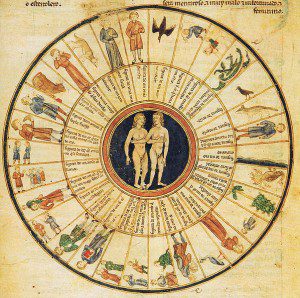Illustration from a medieval Spanish language astrology textbook attributed to Alfonso X the Wise (r. 1252-1284), King of Castile, León and Galicia. The image is meant to depict the effect various other stars or constellations have in concert with Gemini. [public domain / Wikimedia Commons]
***
St. Augustine (354-430) exhibits a remarkably scientific mind, by discussing the counter-example of twins, and how it destroys basic astrological assumptions. I believe this was mentioned in my book on science and Christianity, where I documented many scientific affinities of the Church fathers as a whole, such as belief in the sphericity of the earth, etc. All the words below the asterisks are Augustine’s own.
* * * * *
But, as to what they attempt to make out from that very small interval of time elapsing between the births of twins, on account of that point in the heavens where the mark of the natal hour is placed, and which they call the horoscope, it is either disproportionately small to the diversity which is found in the dispositions, actions, habits, and fortunes of twins, or it is disproportionately great when compared with the estate of twins, whether low or high, which is the same for both of them, the cause for whose greatest difference they place, in every case, in the hour on which one is born; and, for this reason, if the one is born so immediately after the other that there is no change in the horoscope, I demand an entire similarity in all that respects them both, which can never be found in the case of any twins. (City of God, v, 2)
If it be said that certain chosen days have an influence on these things, because the constellations rule over all terrestrial bodies, animate and inanimate, according to differences in moments of time, let it be considered what innumerable multitudes of beings are born or arise, or take their origin at the very same instant of time, which come to ends so different, that they may persuade any little boy that these observations about days are ridiculous. (City of God, v, 7)













